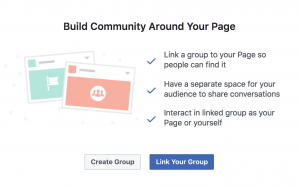
Facebook overnight has announced that it is globally launching ‘Groups for Pages’, which enables the 70 million Pages that exist on Facebook to create fan clubs and groups centred around super-fans of a Page.
The new feature, Groups for Pages, basically enables Musicians, Bands, Brands and more to run an on-site fan club, further giving their owners of these pages a new way to further engage and grow their fans in a more co-operative nature.

The announcement was made by Chris Cox, Facebook’s Chief Product Officer, who gave an example of how the new feature works. He highlighted The Washington Post’s reporters starting a group called PostThis where their journalists and most loyal readers were able to discuss stories. This, Cox wrote “is one of thousands of interesting examples we heard of super-fans who wanted to be a part of the day-to-day discussion of the decisions inside the walls of an organization they care about, and more importantly to connect with everyone else who felt the same way.”
Users can can easily look at a Page’s Groups communities shortcut setup by the page’s admins. Admin’s can also link any existing existing Group to their Page in addition to launching new ones.

Given that Facebook for years have been pushing people to create lists of specific friends to share different posts with, or to just fully embrace “openness” and share publicly. While Facebooks intentions are good, they have found that realistically, people’s values and interests don’t always align with their geographic communities, or even their closest friends.
By pushing users to join and participate in Groups, Facebook gives them homes for the different sides of their prismatic identities. If you are a Facebook user who enjoys a particular band you listen to every day, or a brand you wear or want to talk about the person you vote for, your enthusiastic posts about them might get a more positive and less contentious reception inside a Facebook Group.




